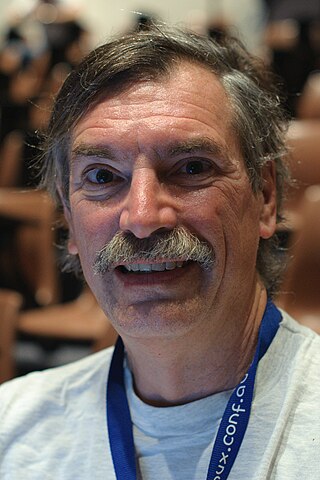
386BSD is a discontinued operating system based on the Berkeley Software Distribution (BSD) that was developed by couple Lynne and William Jolitz. Released on March 17, 1992, it was the first fully operational Unix operating system to be completely free and open source.
The Unix file system (UFS) is a family of file systems supported by many Unix and Unix-like operating systems. It is a distant descendant of the original filesystem used by Version 7 Unix.
USL v. BSDi was a lawsuit brought in the United States in 1992 by Unix System Laboratories against Berkeley Software Design, Inc and the Regents of the University of California over intellectual property related to the Unix operating system; a culmination of the Unix wars. The case was settled out of court in 1994 after the judge expressed doubt in the validity of USL's intellectual property, with Novell and the University agreeing not to litigate further over the Berkeley Software Distribution (BSD).

The BSD Daemon, nicknamed Beastie, is the generic mascot of BSD operating systems. The BSD Daemon is named after software daemons, a class of long-running computer programs in Unix-like operating systems—which, through a play on words, takes the cartoon shape of a demon. The BSD Daemon's nickname Beastie is a slurred phonetic pronunciation of BSD. Beastie customarily carries a trident to symbolize a software daemon's forking of processes. The FreeBSD web site has noted Evi Nemeth's 1988 remarks about cultural-historical daemons in the Unix System Administration Handbook: "The ancient Greeks' concept of a 'personal daemon' was similar to the modern concept of a 'guardian angel' ... As a rule, UNIX systems seem to be infested with both daemons and demons."

The Computer Systems Research Group (CSRG) was a research group at the University of California, Berkeley that was dedicated to enhancing AT&T Unix operating system and funded by Defense Advanced Research Projects Agency.

Keith Bostic is an American software engineer and one of the key people in the history of Berkeley Software Distribution (BSD) Unix and open-source software.

Berkeley Software Design, Inc., was a corporation which developed, sold licenses for, and supported BSD/OS, a commercial and partially proprietary variant of the BSD Unix operating system for PC compatible computer systems. The name was chosen for its similarity to "Berkeley Software Distribution" the source of its primary product.
UNIX/32V is an early version of the Unix operating system from Bell Laboratories, released in June 1979. 32V was a direct port of the Seventh Edition Unix to the DEC VAX architecture.

The history of Unix dates back to the mid-1960s, when the Massachusetts Institute of Technology, AT&T Bell Labs, and General Electric were jointly developing an experimental time-sharing operating system called Multics for the GE-645 mainframe. Multics introduced many innovations, but also had many problems. Bell Labs, frustrated by the size and complexity of Multics but not its aims, slowly pulled out of the project. Their last researchers to leave Multics – among them Ken Thompson, Dennis Ritchie, Doug McIlroy, and Joe Ossanna – decided to redo the work, but on a much smaller scale.

John S. Quarterman is an American author and longtime Internet participant. He wrote one of the classic books about networking prior to the commercialization of the Internet. He has also written about risk management.
In BSD-derived computer operating systems and in related operating systems such as SunOS, a disklabel is a record stored on a data storage device such as a hard disk that contains information about the location of the partitions on the disk. Disklabels were introduced in the 4.3BSD-Tahoe release. Disklabels are usually edited using the disklabel utility. In later versions of FreeBSD, this was renamed as bsdlabel.

Marshall Kirk McKusick is a computer scientist, known for his extensive work on BSD UNIX, from the 1980s to FreeBSD in the present day. He was president of the USENIX Association from 1990 to 1992 and again from 2002 to 2004, and still serves on the board. He is on the editorial board of ACM Queue Magazine. He is known to friends and colleagues as "Kirk".
In computing, tput is a standard Unix operating system command which makes use of terminal capabilities.

The Berkeley Software Distribution or Berkeley Standard Distribution (BSD) is a discontinued operating system based on Research Unix, developed and distributed by the Computer Systems Research Group (CSRG) at the University of California, Berkeley. The term "BSD" commonly refers to its open-source descendants, including FreeBSD, OpenBSD, NetBSD, and DragonFly BSD.
ptrace is a system call found in Unix and several Unix-like operating systems. By using ptrace one process can control another, enabling the controller to inspect and manipulate the internal state of its target. ptrace is used by debuggers and other code-analysis tools, mostly as aids to software development.

In Unix and operating systems inspired by it, the file system is considered a central component of the operating system. It was also one of the first parts of the system to be designed and implemented by Ken Thompson in the first experimental version of Unix, dated 1969.
Samuel J Leffler is a computer scientist, known for his extensive work on BSD, from the 1980s to FreeBSD in the present day. Among other projects, he created HylaFAX, LibTIFF, and the FreeBSD Wireless Device Drivers.
The Seventh Edition Unix terminal interface is the generalized abstraction, comprising both an application programming interface for programs and a set of behavioural expectations for users, of a terminal as historically available in Seventh Edition Unix. It has been largely superseded by the POSIX terminal interface.

NextBSD was an operating system initially based on the trunk version of FreeBSD as of August 2015. It was a fork of FreeBSD which implemented new features developed on branches, but not yet implemented in FreeBSD. As of 2019, the website is defunct, with the last commits on GitHub dating to October 2019. The Wayback Machine captures of the website after December 15, 2017 are domain squatter pages, and as of March 17, 2021, the site is redirects to a fake "Apple Support" page.
The History of the Berkeley Software Distribution begins in the 1970s.









